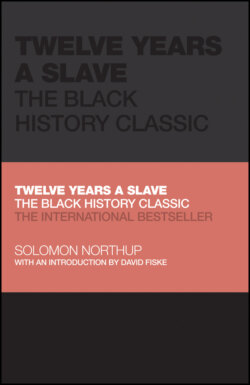Читать книгу Twelve Years a Slave - Solomon Northup - Страница 19
NORTHUP'S POPULAR LEGACY
ОглавлениеNorthup's story cries out for dramatization, and he himself was involved with two projects that brought the story to the stage. These plays were not entirely faithful to his book, and sources indicate that they may not have been particularly successful. Minor productions were presented in Troy, New York, in 1858 (11), and in New York City in 1859 (12). The play in Troy was described as “the moral drama of ‘Sol Northrop [sic], the Slave,’ with lots of singing and dancing.” It was presented at the National Theatre in New York as The Slave: Or, The Kidnapper's Victim, and per an advertisement included four characters: Ichabod Bass, “Platt, the slave,” Sam (“a consequential nigger”), and Eliza (“a Quadroon”). Yankee Leffler and Miss Clara Le Roy appeared in both the Troy and New York productions, assisted by W. M. Ward and W. M. Reeve, who played the additional roles in the New York version.
Despite the fame it won on release, Twelve Years a Slave soon faded from public consciousness, and over a century became obscure. It was not until Louisiana State University Press's publication of the Lodgson/Eakin annotated edition in 1968 that the Northup story became better known again, and not only to scholars of slavery. In 1984, awareness was increased when an American Playhouse production aired on PBS, titled Solomon Northup's Odyssey (also known by the title Half Slave, Half Free), directed by Gordon Parks.
However, it would take until 2013 for Northup to once again become a household name. British director Steve McQueen had long wanted to bring a story of slavery to the screen, and was struggling with a fictional script based on a free man sold into bondage. Then his partner, cultural historian Bianca Stigter, discovered the then little-known Northup account. She could not put it down, and told her husband, “You do not have to write a script any more, this book is the script.” (13). The subsequent film, 12 Years a Slave, won nine Academy Awards, including Best Picture.
The script, credited to John Ridley and Solomon Northup, is largely true to the 1853 book. A few liberties are taken here and there. The film incorrectly gives the impression that Northup's first owner in Louisiana, William Prince Ford, was aware of Northup's background as a freeman – and didn't care. But Northup writes that, for his entire time in the South (with the exception of Samuel Bass, whom he had come to trust), he kept silent about his Northern heritage and having been kidnapped.
